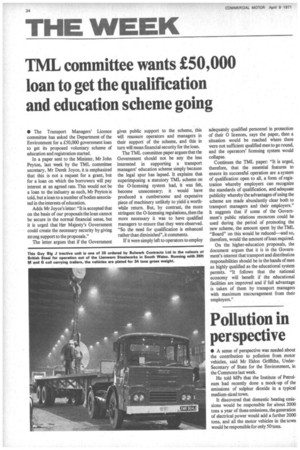TML committee wants £50,000 loan to get the qualification and education scheme going
Page 36

If you've noticed an error in this article please click here to report it so we can fix it.
• The Transport Managers' Licence committee has asked the Department of the Environment for a £50,000 government loan to get its proposed voluntary scheme of education and registration started.
In a paper sent to the Minister, Mr John Peyton, last week by the TML committee secretary, Mr Derek Joyce, it is emphasized that this is not a request for a grant, but for a loan on which the borrowers will pay interest at an agreed rate. This would not be a loan to the industry as such, Mr Peyton is told, but a loan to a number of bodies associated in the interests of education.
Adds Mr Joyce's letter: "It is accepted that on the basis of our proposals the loan cannot be secure in the normal financial sense, but it is urged that Her Majesty's Government could create the necessary security by giving strong support to the proposals."
The letter argues that if the Government gives public support to the scheme, this will reassure operators and managers in their support of the scheme, and this in turn will mean financial security for the loan.
The TML committee paper argues that the Government should not be any the less interested in supporting a transport managers' education scheme simply because the legal spur has lapsed. It explains that superimposing a statutory TML scheme on the 0-licensing system had, it was felt, become unnecessary; it would have produced a cumbersome and expensive piece of machinery unlikely to yield a worthwhile return. But, by contrast, the more stringent the 0-licensing regulations, then the more necessary it was to have qualified managers to ensure that they were observed. "So the need for qualification is enhanced rather than diminished", it comments.
If it were simply left to operators to employ adequately qualified personnel in protection of their 0 licences, says the paper, then a situation would be reached where there were not sufficient qualified men to go round, and the operators' licensing system would collapse.
Continues the TML paper: "It is urged, therefore, that the essential features to ensure its successful operation are a system of qualification open to all, a form of registration whereby employers can recognize the standards of qualification, and adequate publicity whereby the advantages of using the scheme are made abundantly clear both to transport managers and their employers." It suggests that if some of the Government's public relations resources could be used during the period of promoting the new scheme, the amount spent by the TML -Board" on this would be reduced—and so, therefore, would the amount of loan required.
On the higher-education proposals, the document argues that it is in the Government's interest that transport and distribution responsibilities should be in the hands of men as highly qualified as the educational system permits. "It follows that the national economy will benefit if the educational facilities are improved and if full advantage is taken of them by transport managers with maximum encouragement from their employers."




































































































































